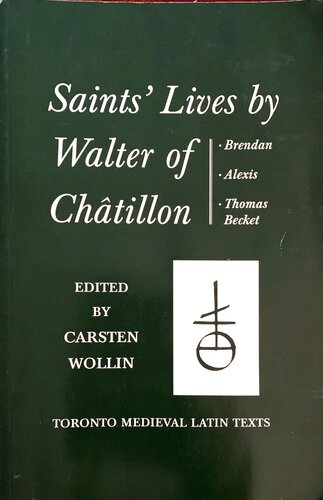

Most ebook files are in PDF format, so you can easily read them using various software such as Foxit Reader or directly on the Google Chrome browser.
Some ebook files are released by publishers in other formats such as .awz, .mobi, .epub, .fb2, etc. You may need to install specific software to read these formats on mobile/PC, such as Calibre.
Please read the tutorial at this link: https://ebookbell.com/faq
We offer FREE conversion to the popular formats you request; however, this may take some time. Therefore, right after payment, please email us, and we will try to provide the service as quickly as possible.
For some exceptional file formats or broken links (if any), please refrain from opening any disputes. Instead, email us first, and we will try to assist within a maximum of 6 hours.
EbookBell Team

4.4
32 reviewsSaints Brendan, Alexis, and Thomas Becket,
all written anonymously but here ascribed to Walter of Châtillon (c. 1130-1200). A full critical edition is in preparation for the series Corpus Christianorum, continuatio medieavalis; the single manuscript edition offered here has been prepared to make these texts quickly and easily available to the public and more accessible to students. The ascription of the Vita S. Brandani, Vita S. Alexii, and Vita S. Thome to Walter of Châtillon is based primarily on a great number of common stylistic features; all three poems have parallels both with one another and with other of Walter's known works.
Dedicated to Pope Alexander III, c. 1163/64, the Vita S. Brandani is a poetic translation of the Anglo-Norman Voyage de Saint Brendan (also in verse) by Benedeit, using the Latin prose Navigatio to fill in gaps in Benedeit's version. The Vita S. Alexii is based on a Latin prose translation, made at the end of the tenth century in the monastery of St Boniface in Rome, of the Greek version of the legend of St Alexis. The Vita S. Thome was written after the murder of Thomas Becket on 29 December 1170 but before his consecration as a saint on 21 February 1173 and makes use of oral and written accounts by Becket's friends. It is dedicated to a high ecclesiastic, perhaps the archbishop of Reims (William 'of the White Hands'), or even Pope Alexander III.
The Latin of all three poems, which employ the 'goliardic' line and stanza, is difficult, and the texts are supported by numerous notes to aid translation. The edition is also accompanied by an introduction, textual notes and an appendix listing selected parallels with other works of Walter of Châtillon.